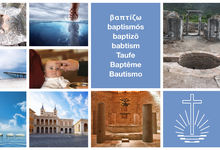The sacraments (57): A proxy for baptism?
There is one particular Bible verse that has been giving interpreters a lot of headaches—and for the last 1,800 years to boot. And yet it is precisely this passage that constitutes the third pillar supporting the New Apostolic Church’s conception of salvation for the departed. Ultimately it boils down to a question of the power of a sacrament.

It is a hard nut that Apostle Paul has left us to crack in 1 Corinthians 15: 29: “Otherwise, what will they do who are baptised for the dead, if the dead do not rise at all? Why then are they baptised for the dead?”
A single verse that has caused a lot of debate
The meaning of this passage is disputed. The verse has “prompted a great investment of shrewdness and sophistication”, as one leading Bible commentator remarks smugly. From the early Church Fathers to the Reformers to the present, scholarly literature on the subject incorporates some 200 different interpretations.
A scholarly consensus has crystalised in the meantime, however. According to this understanding, the verse has to do with a practice known as vicarious (or proxy) baptism: Christians in Corinth were baptised on behalf of the unbaptised departed so that they too could benefit from resurrection in Christ. Philologically speaking, this is the most convincing explanation—and the majority of interpreters are in agreement on this.
The Apostle has no objection
This verse is the only Bible passage to ever make reference to this issue. Why does Paul even mention the baptism for the dead in the first place? The answer is very simple: some of the Christians in Corinth refused to believe in the resurrection. However, some among them practised this vicarious baptism. Apostle Paul clearly states that such a practice would be pointless without the resurrection, thereby beating the deniers at their own game.
And how does the Apostle assess this sacramental practice for the departed? The Bible text itself reflects neither approval nor rejection on the part of the Apostle. Above all, more recent Bible commentaries agree that Paul would hardly have used the baptism of the dead as an argument for the resurrection if he had been against it. He talks about it here as if it were a matter of course.
A belief rooted in two cultures
How did the people of Corinth arrive at such a rite? The Christians of the region lived in an open, multicultural environment. And they had a decidedly sacramental understanding of baptism for that time period. In other words, they attributed great power to this act.
And a part of the church believed that this power extended all the way into the beyond. Scholars believe they have identified the roots of this notion in both the Judaic and Greek cultures:
- Plato already made mention of mystery cults within the Orphic tradition, in which rites involving a bath of immersion were believed to serve for the redemption of the dead. Ancient grave inscriptions from what is today Western Turkey attest that such sacred ceremonies were indeed celebrated.
- the second book of Maccabees gives an account of a battle in which Jewish soldiers died in battle wearing idol amulets. Those left behind collected money and sent it to the temple in Jerusalem: in so doing, they hoped to make “a reconciliation for the dead, that they might be delivered from sin”. The special parallel to Christendom is that this too reflects a hope in the resurrection.
More widespread than originally assumed
Older Bible commentaries often dismiss vicarious baptism as nothing more than a sectarian custom. This also has to do with the fact that a similar practice was indeed common later on in communities on the fringes of the early church.
More recent scholarly literature assumes that the baptism for the dead was completely normal in Corinth, and that it was perhaps even practised in other Pauline churches. In any event, the idea of salvation after death was more widespread in early Christianity than generally assumed.
Signs of the power of the sacrament
And indeed, Church Fathers from the second through the fourth centuries were known to have engaged in similar approaches and divergent rites in different corners of the Christian world from time to time. At the very least, this demonstrates that there was always a fundamental need on the part of the believers to know that the path to salvation in Christ had also been established for their dead.
So it is that the celebrated theologian Dietrich Bonhoeffer poses the question: “Why shouldn’t it be possible for such a custom—as an extreme … expression of the power of the sacrament—to derive from such a conception of baptism?”
A Bishops’ conference forbade the practice of vicarious baptism, right? That is the usual story in any case. But this is not quite true either. How things developed with respect to the sacraments for the departed: this will be the focus of the next two issues of this series.
Photo: Weerapat Wattanapichayakul













